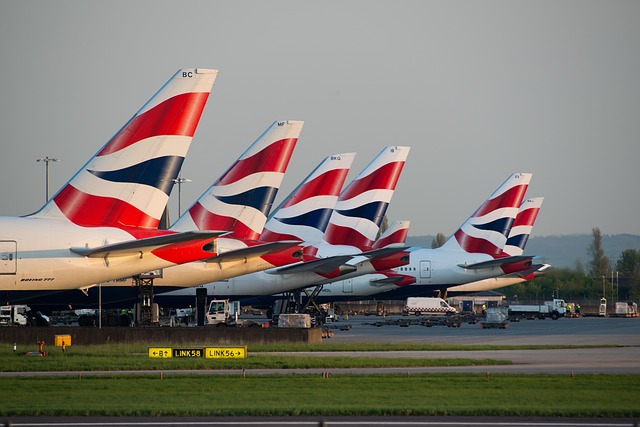Aviation Training and English Proficiency in Belgium's Sector
In Belgium, many individuals may not be aware that proficiency in English can significantly enhance career pathways in aviation. This sector is experiencing growth, with various roles available that require effective communication skills. Understanding the roles and conditions within this industry can provide valuable insights for those interested in pursuing a career in aviation.

Belgium’s aviation industry represents a significant component of the country’s transportation infrastructure and economy. With its strategic location at the heart of Europe, Belgian airports serve as vital connection points for international travel and commerce. This positioning creates unique opportunities and challenges for aviation professionals working within the sector. Training programs and language requirements in Belgium reflect both European regulations and the global nature of the industry, with particular emphasis on technical competency and communication skills across linguistic boundaries.
Understanding the Aviation Sector in Belgium and Beyond
Belgium hosts several important aviation facilities, including Brussels Airport (Zaventem), which serves as the country’s primary international gateway, and Charleroi Airport, which has become a significant base for low-cost carriers. The country is also home to Brussels Airlines, part of the Lufthansa Group, and maintains a strong presence in air traffic control through skeyes (formerly Belgocontrol), which manages one of Europe’s most complex airspaces.
The Belgian aviation sector extends beyond commercial passenger transport to include cargo operations, maintenance facilities, and specialized services. Training institutions in Belgium have adapted to meet these diverse needs, offering programs ranging from pilot certification to aircraft maintenance engineering and air traffic management. These programs typically follow European Union Aviation Safety Agency (EASA) standards, ensuring credentials are recognized throughout Europe and beyond.
The aviation landscape in Belgium continues to evolve with technological advancements and changing regulatory frameworks. Training providers must continuously update their curricula to incorporate new aircraft systems, operational procedures, and safety protocols. This dynamic environment requires aviation professionals to commit to lifelong learning and skill development throughout their careers.
Importance of English Proficiency in Aviation Careers
English serves as the international language of aviation, a standard established by the International Civil Aviation Organization (ICAO). For Belgian aviation professionals, whose country officially recognizes Dutch, French, and German, English proficiency represents an essential qualification rather than merely an additional skill. All communications between pilots and air traffic controllers across international boundaries occur in English, making language competency a critical safety factor.
ICAO has established a six-level scale for English language proficiency, with Level 4 (Operational) being the minimum standard for pilots and controllers. Belgian training programs incorporate specialized aviation English courses that focus not only on general language skills but also on standard phraseology, technical vocabulary, and clear communication under pressure. These programs address the unique challenges of radio communications, including managing accents, dealing with transmission quality issues, and maintaining clarity during emergency situations.
Beyond operational requirements, English proficiency enhances career mobility for Belgian aviation professionals. It enables them to work seamlessly across borders, participate in international training programs, and access a broader range of professional opportunities. Many Belgian aviation training institutions offer dedicated language courses or integrate English instruction throughout their technical curricula to ensure graduates meet both linguistic and technical requirements.
Roles and Conditions in the Growing Aviation Industry
The aviation sector encompasses diverse career paths with varying training requirements and working conditions. Commercial pilots typically complete between 18-24 months of intensive training, including theoretical knowledge instruction and flight hours. In Belgium, this training follows EASA regulations and can be completed at approved flight schools such as the CAE Oxford Aviation Academy or ASL Academy.
Aircraft maintenance technicians undergo similarly rigorous preparation, with programs lasting 2-4 years depending on specialization. These programs combine classroom instruction with hands-on experience and culminate in EASA Part-66 licensing. Belgian training institutions like SABENA Aerospace Academy offer internationally recognized maintenance training programs.
Air traffic controllers represent another critical role, requiring approximately three years of specialized training. In Belgium, this training is primarily conducted through skeyes’ own academy, with a highly selective admission process and intensive instruction in both technical skills and English language proficiency.
Working conditions across these roles vary significantly. Pilots contend with irregular schedules, frequent time zone changes, and extended periods away from home. Maintenance technicians often work in shifts, including nights and weekends, to ensure aircraft availability. Air traffic controllers face high-stress environments requiring intense concentration for extended periods. Across all roles, continuing education and regular proficiency checks remain constant features of aviation careers.
Aviation Training Institutions and Programs in Belgium
Belgium offers several pathways for aviation training across various specializations. For pilot training, options include integrated ATPL (Airline Transport Pilot License) programs at schools like Ben-Air Flight Academy and the European Flight Academy (connected to Brussels Airlines). These programs typically cost between €70,000 and €120,000 and take approximately 18 months to complete when pursued full-time.
For maintenance training, institutions such as SABENA Aerospace Academy and VIVES University of Applied Sciences offer programs leading to EASA Part-66 certification. These programs generally range from €10,000 to €30,000 depending on specialization and duration.
Air traffic control training occurs primarily through skeyes’ in-house academy, with successful candidates receiving a salary during their training period in exchange for a service commitment afterward.
| Institution | Program Type | Duration | Certification |
|---|---|---|---|
| Ben-Air Flight Academy | Integrated ATPL | 18 months | EASA ATPL |
| European Flight Academy | Integrated ATPL | 20 months | EASA ATPL |
| SABENA Aerospace Academy | Aircraft Maintenance | 2-4 years | EASA Part-66 |
| VIVES University | Aerospace Engineering | 3 years | Bachelor + EASA Part-66 |
| skeyes Academy | Air Traffic Control | 2-3 years | EASA ATC License |
Prices, rates, or cost estimates mentioned in this article are based on the latest available information but may change over time. Independent research is advised before making financial decisions.
English Language Requirements and Certification
Aviation professionals in Belgium must meet specific English language standards depending on their roles. For pilots and air traffic controllers, ICAO Language Proficiency Requirements mandate a minimum of Level 4 (Operational) on the six-point ICAO scale. This level requires not just basic communication skills but the ability to handle unexpected situations, resolve misunderstandings, and communicate effectively in non-routine scenarios.
Certification involves a specialized assessment focusing on pronunciation, structure, vocabulary, fluency, comprehension, and interactions. In Belgium, these assessments are conducted by approved language examiners at institutions like the Belgian Civil Aviation Authority (BCAA) or authorized training organizations. Depending on the score achieved, language proficiency endorsements remain valid for different periods: Level 4 requires reassessment every 4 years, Level 5 every 6 years, while Level 6 (Expert) does not expire.
Many training programs incorporate aviation English throughout their curricula, while others offer dedicated courses for professionals needing to improve their language skills. These specialized courses focus on radiotelephony procedures, standard phraseology, and plain language proficiency for non-standard situations. The emphasis remains on clear, concise communication as a fundamental safety component rather than merely a regulatory requirement.
Conclusion
Aviation training in Belgium represents a significant investment in both time and resources, reflecting the high standards and responsibilities associated with careers in this sector. The integration of rigorous technical training with comprehensive English language proficiency creates professionals capable of operating safely and effectively within the international aviation community. As Belgium continues to maintain its important position in European aviation, its training institutions and language requirements will likely evolve to meet emerging technologies and changing industry demands, while maintaining the fundamental focus on safety and effective communication that defines the aviation profession worldwide.




